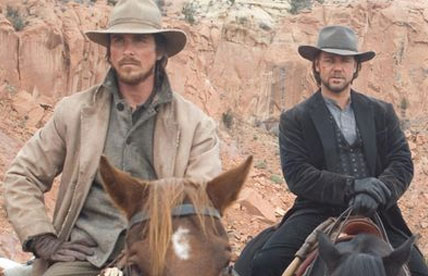
Named for a particular train its characters are trying to catch, 3:10 To Yuma is a much more interesting and exciting film than its title might suggest. That’s because of who it is that is going to be riding the train, and why.
We can blame Elmore Leonard, who wrote the short story that the film’s based on, for that title. The setting is the Old West, the train is headed for a federal prison, and its passenger doesn’t want to be on it, but is given little choice in the matter. Legendary outlaw, stagecoach robber and killer Ben Wade, leader of a small army of followers, got uncharacteristically sloppy, and was captured. In order to get him out of town before his gang find out what happened and raze the place to free him, the lawmen must get Wade to the train and quickly and quietly as possible.
Playing the part of Wade is a perfectly cast Russell Crowe. Wade is the sort of outsized character that would seem comical in most other genres—he dresses like a manly dandy in black, he’s an accomplished artist who sketches desert birds and hangs his drawings on lonesome cacti, charismatic and seemingly noble, he’s not a bad guy for a bad guy.
A charming thug whom people hate to love—if that’s not a Russell Crowe role, I don’t know what is.
Wade’s path crosses that of a down-on-his-luck, wooden-legged Civil War vet-turned-rancher Dan Evans (Christian Bale) coincidentally and repeatedly one day, and the rancher happens to be on hand when Wade’s captured and wealthy railroad man Butterfield (Dallas Roberts) offers big money to volunteers to help get Wade on the train.
Suffering not only from drought and financial troubles, but the palpable shame he feels from his wife and two sons, Evans takes the job, joining a small posse that includes a grizzled Pinkerton played by Peter Fonda, in his best role in years.
As directed by James Mangold (Walk the Line), 3:10 To Yuma makes plenty of room for Crowe to show off and Bale to smolder, while making with lots of chasing and gunfights, with its climax a stressful run to the station that scans not unlike a videogame plays. But for all its action, Mangold’s film is also a sharply observed one, the prelude to a stagecoach robbery focusing on the sounds of gritty sand thrown up by wooden wheels and the jingling of the horses’ harnesses.
This isn’t the first time Leonard’s short has been made into a western. In 1957, Glenn Ford played Wade in a 3:10 To Yuma (complete with a completely inappropriate theme song by Frankie Laine).
Writing credits for Mangold’s version are given not only to the team of Derek Haas and Michael Brandt (2 Fast 2 Furious, Catch That Kid), but also to the previous adaptation’s writer Halsted Welles. There’s a pretty wide gulf between the two films, though. This seems to be more of a second adaptation than a remake.
Despite its history with the genre, Mangold’s version falls clearly into the post-deconstructionist Western mold. The previous film’s hero did the right thing, resisting temptations and daring life-threatening dangers along the way, simply because it was the right thing. Bale’s hero similarly risks his life, surviving an even greater gamut of dangers, but his motivations shift like mercury, from economic desperation to serving justice to ultimately achieving the sort of notoriety and glory afforded Wade. After all, the only men as famous as notorious outlaws are those that best them.
It’s not quite as meta a Western as other deconstructionist takes on the genre (Unforgiven, Dead Man), but in abstracting the conflict of the two men into one’s attempt to live down his legend and the other’s attempt to become a legend, Mangold manages to carefully take the Western apart, examine and celebrate its components, and then hastily reassemble it before viewers’ eyes.
It’s a re-deconstructionist western, and it’s a damn good one.


saw this last night, really enjoyed it. actual tense energy!
christian b. is becoming one of my favorite actors.